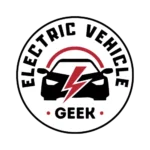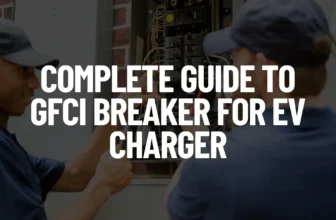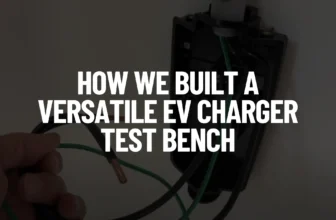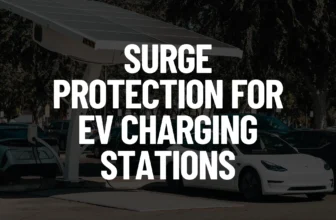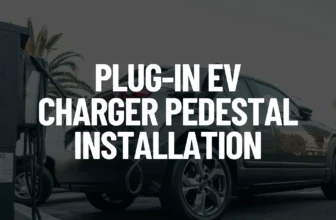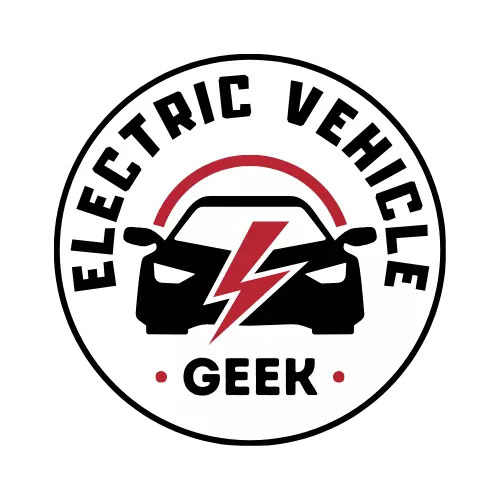The best 30 amp breaker for an EV charger guarantees safe, efficient Level 2 EV charging, providing enough power for faster charging while prioritizing electrical safety.
While 50-amp EV charger circuit breakers are standard for Level 2 EV chargers, some electric vehicle branch circuits call for a 30-amp solution. This can be due to Level 2 chargers designed for this amperage or existing wiring or limiting EV charging panel capacity that might necessitate a 30-amp setup.
The diagram below shows the installation of popular 30-amp electric car chargers such as Grizzl-E Classic Level 2 240V charger, Hardwired Home Flex Level 2 EV Charger, and 30-amp Tesla Charger (Tesla Wall Connector) specifically designed to work on a 30-amp circuit.
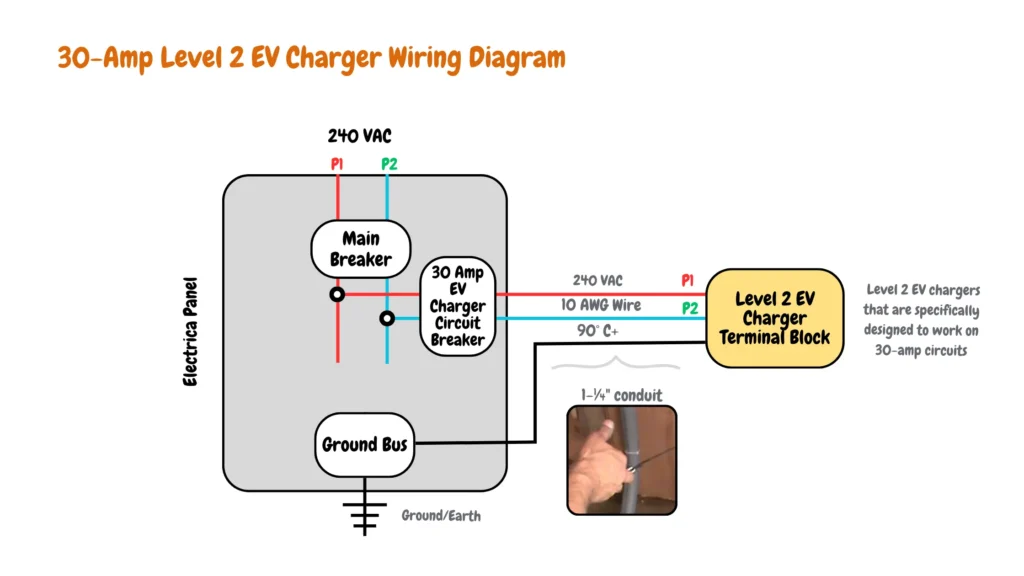
Using a 30-amp breaker delivers slower charging speeds compared to a 50-amp setup. This might be a compromise if faster charging isn’t crucial. Choosing the correct breaker size ensures safe EV charging by preventing circuit overload. When your Level 2 EV charger, EV charger electrical panel, and electric vehicle branch circuit wiring are limited to 30 amps, a 30-amp breaker is the optimal choice.
Choosing a 30-amp breaker for your EV charger isn’t a one-size-fits-all situation. Just like other electrical components, 30-amp breakers come in various options from different brands, each suited for specific uses.
This guide will help you navigate this selection process. We’ll highlight the top brands and explain ideal applications for each. Most importantly, you’ll learn why you might need one, and what size wire for 30-amp breakers.
Table of Contents
Best 30 Amp Breaker for an EV Charger
When shopping for the best 30 amp breaker for an EV charger, you will either need to choose between a 30 amp single pole EV charger circuit breaker or a 30 amp double pole EV charger circuit breaker, you will also need to ensure compatibility with your electrical panel, and also consider reputable brands known for reliability and durability.
Looking for the perfect 30-amp breaker for your EV charger installation? We’ll break down common circuit breaker brands alongside their advantages in electric vehicle branch circuit panels and configurations:
Square D 30 Amp Breaker for an EV Charger
Square D electrical components offer exceptional quality when it comes to EV charger installations if your electrical panel is compatible with the Square D 30 amp breaker, we recommend Square D (Homeline) 30A for single panel EV charger installation and Sq D by Schneider (QO GFCI) 30A for double pole EV charger installation.
As certified EV charger installers, we love working with Square D products in EV charger installations, as they are best when you have tight deadlines and budget to complete an EV charger installation, due to their plug-on configuration installation time is reduced and costs are also reduced.
Siemens 30 Amp Breaker for an EV Charger
Siemens circuit breakers are cost-effective, and user friendly, if your electrical panel is compatible with Siemens circuit breakers we recommend Siemens Q230 30A for double pole Level 2 EV charger installations.
We recommend the installation of Siemens circuit breakers on Siemens EV charger panels, the combinations give your EV charger installation an intuitive design, convenient bar access, and durable copper bus bars. Backed-out terminal screws simplify installation, and converting to sub-panels or neutral bars is notably easier compared to competing models. Moreover, Siemens circuit breakers offer cost-effective solutions without compromising EV charging circuit functionality.
GE 30 Amp Breaker for an EV Charger
For Level 2 EV charger installation compatible with General Electric (GE) 30-amp circuit breakers, we recommend the GE THQL1130 30A EV charger circuit breaker for single-pole Level 2 EV charger installations, or the GE THQL2130GFTP 30A circuit breaker for double-pole installations.
When installing the above GE circuit breakers in a GE electrical panel due to compatibility issues, we found that they offer quick and easy EV charger installation, thanks to the panel’s lockouts for electric vehicle branch circuits wiring and cables for installation of the EV charger circuit breaker.
Cutler Hammer 30 Amp Breaker for an EV Charger
For homeowners shopping for a Cutler Hammer 30 amps EV charger circuit breaker compatible with their electrical panel, we recommend Cutler Hammer CHF130 (30A) for single pole installations or Cutler Hammer CH230 (30A) for double pole Level 2 EV charger installations.
Cutler Hammer EV charger circuit breakers are one of the best when it comes to solving EV charger circuit breaker tripping issues, especially for a homeowner who doesn’t know which breaker powers which appliances, thanks to their special feature (called “trip to off.”) that detects which circuit breaker been tripped.
Types of Best 30 Amp Breaker for an EV Charger
We have classified the above circuit breakers based on 30 amps single pole EV charger installations, and 30 amps double pole EV charger installations. When shopping for a 30 amps Level 2 EV charger circuit breaker you will need to choose between single-pole or double-pole options, the difference lies in the size, wiring, and electric vehicle branch circuit they support.
This diagram below compares the wiring configurations for 30-amp single-pole and double-pole breakers.
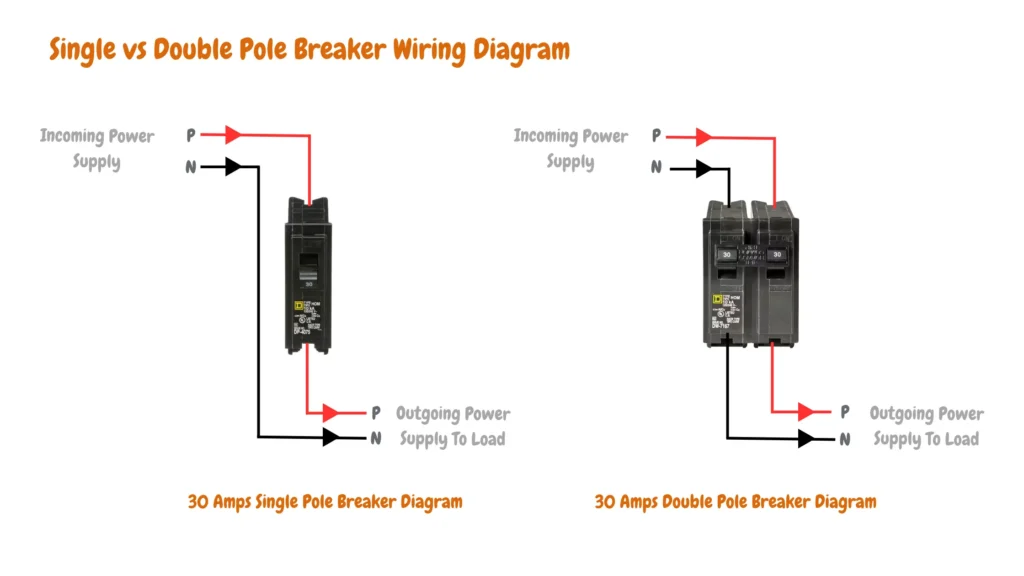
30A EV Charger Circuit Breaker (Single-Pole)
Level 2 EV charging with a 30-amp single pole circuit breaker is all about the single, slim switch on your electric vehicle branch circuit electrical panel. This breaker handles one “hot” wire and a neutral one, perfect for delivering 240-volt power to your single pole Level 2 EV charger installation.
30A EV Charger Circuit Breaker (Double-Pole)
30-amp double-pole EV charger circuit breaker takes up two slots in your panel and boasts two distinct switches controlling two “hot” wires and a neutral wire.
Frequently Asked Questions.
Can I Charge My EV on a 30-Amp Circuit?
Yes, some Level 2 EV chargers can work on a 30A circuit, offering a budget-friendly option. Expect slower charging, and consult an electrician to confirm system compatibility and safe installation.
How Fast Does a 30-Amp Level 2 Charger Work?
A 30-amp Level 2 EV charger typically delivers around 6.6 kW to 7.2 kW of power. This translates to adding 18-22 miles of range per hour of charging for a typical passenger car battery. The exact kW output can vary slightly depending on charger efficiency and minor fluctuations in your home’s voltage. However, this range provides a good estimate of the practical charging speed of these chargers.
What Gauge Wire for a 30-Amp EV Charger?
For a 30-amp EV charger, the recommended wire size is 10 AWG if using copper wires. While 10 gauge is the minimum size, you can opt for a thicker gauge wire. Using a thicker wire can safely conduct more power, though it may increase costs and pose installation challenges.
How Does the 80% Rule Apply to a 30 Amp Breaker Used for EV Chargers?
For a 30 amp breaker, the 80% rule means it should ideally carry no more than 24 amps continuously (30 amps x 0.8 = 24 amps). This ensures the breaker operates within safe limits, preventing overheating and minimizing the risk of electrical fires or equipment damage.
What Considerations Should Be Made When Choosing a 30 Amp Breaker for an EV Charger?
When selecting a 30 amp breaker for EV charger installations, ensure it is rated for continuous use at or below 24 amps. This compliance with the NEC’s 80% rule ensures reliable and safe operation of the EV charging circuit.
Can a 30 Amp Breaker Exceed 24 Amps in Certain Situations?
While a 30 amp breaker is rated for occasional surges up to 30 amps, continuous operation at or near its full capacity can lead to overheating and potential circuit failure. Adhering to the NEC’s 80% rule helps maintain circuit longevity and safety.
Related Posts
- How to Wire a Main Circuit Breaker Panel for EV Charging
- How to Wire an EV Charger SubPanel
- EV Charger Circuit Breaker Keeps Tripping: Causes, Troubleshooting and Solutions

James Ndungu is a certified EV charger installer with over five years of experience in EVSE selection, permitting, and installation. He holds advanced credentials, including certification from the Electric Vehicle Infrastructure Training Program (EVITP) and specialized training in EV charging equipment and installation, as well as diplomas in EV Technology and Engineering Fundamentals of EVs. Since 2021, James has tested dozens of EV chargers and accessories, sharing expert insights into the latest EV charging technologies.
Last update on 2026-03-03 / Affiliate links / Images from Amazon Product Advertising API
